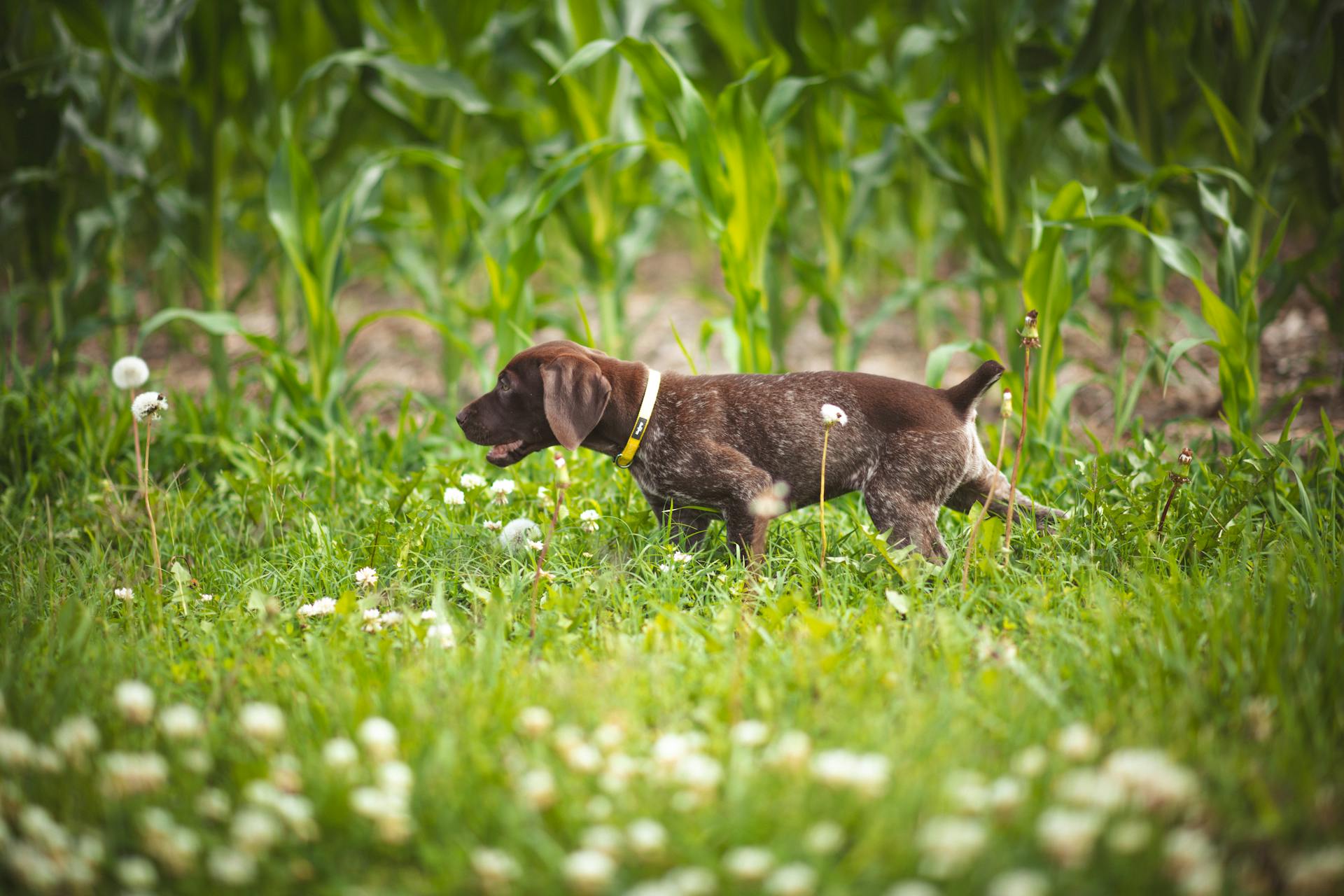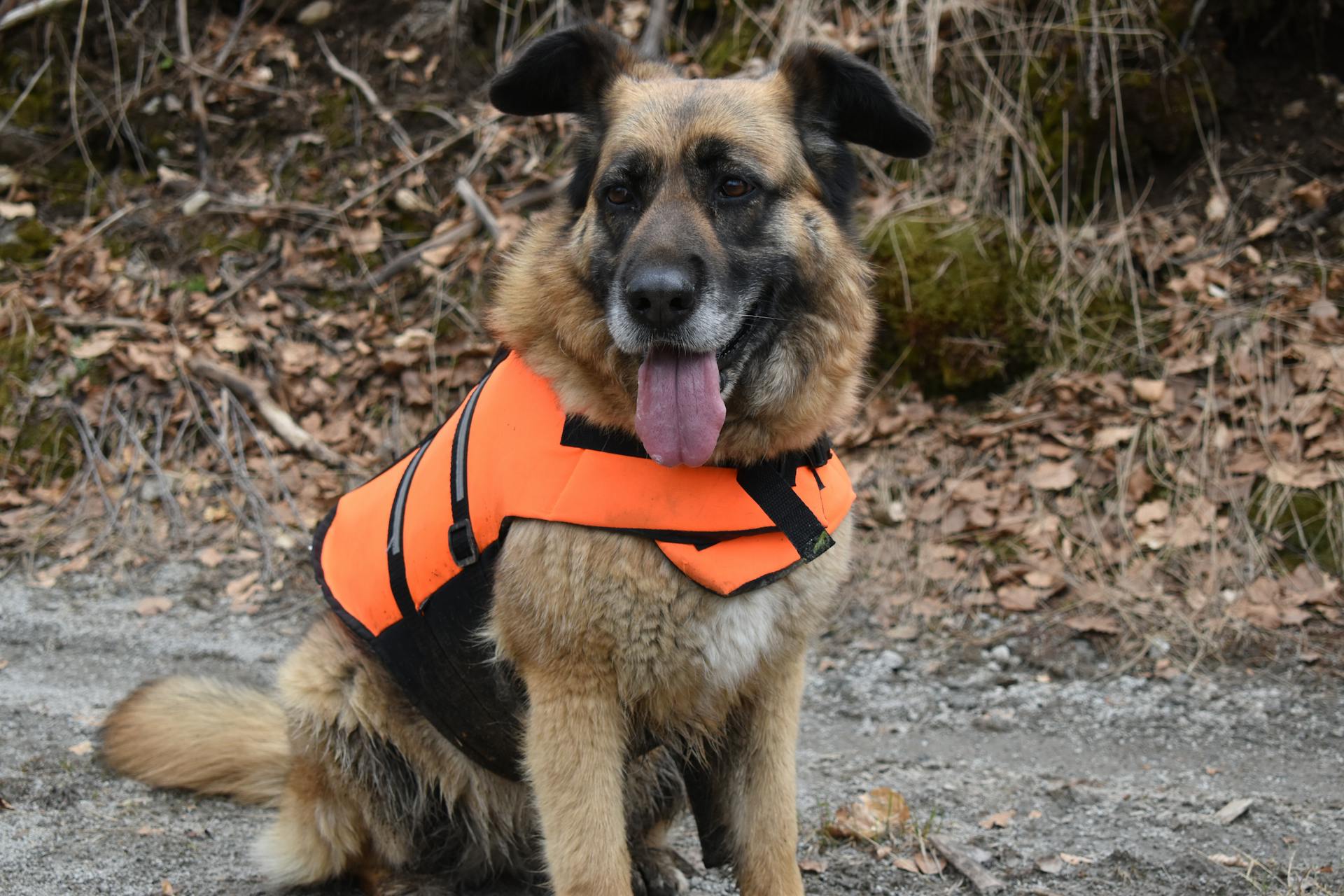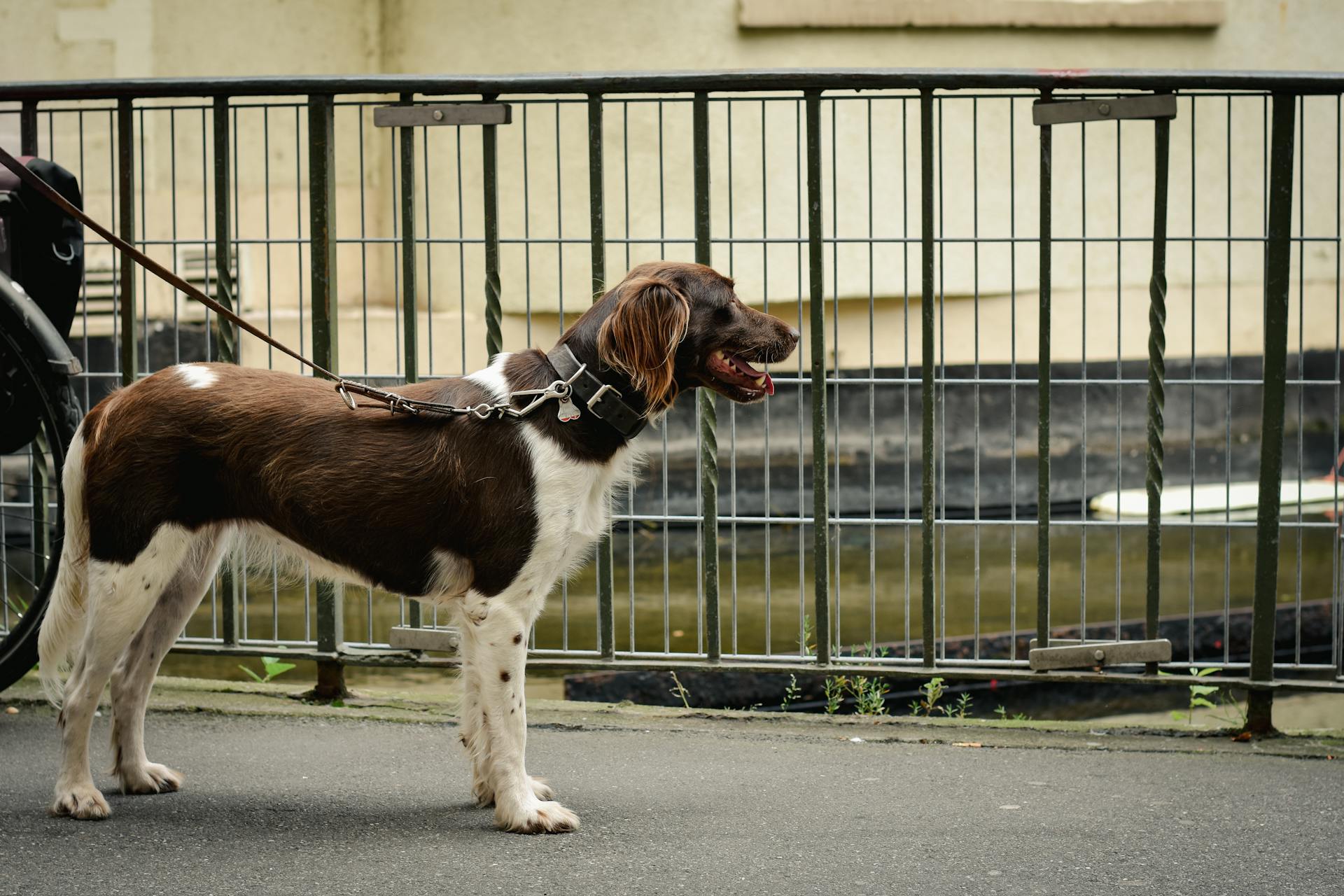
The Roan Small Munsterlander is a versatile hunting dog that originated in Germany. They are bred to hunt small game such as rabbits and hares.
Their distinctive roaning coat pattern is a result of the interaction between black and red pigment, creating a mottled appearance. This unique coat pattern helps them blend in with their surroundings.
Roan Small Munsters are highly energetic dogs that require regular exercise to stay happy and healthy. They need at least an hour of physical activity daily, which can be achieved through running, hiking, or playing fetch.
Their intelligence and trainability make them a joy to work with, but they can be strong-willed at times, requiring patient and consistent training.
Key Characteristics
The Roan Small Munsterlander is a wonderful breed, but it's essential to understand their key characteristics to ensure you're prepared for their needs.
They are loyal and affectionate dogs that bond deeply with families and enjoy human interaction. This makes them excellent family companions, but it also means they thrive on companionship and may not do well alone for extended periods.
Their intelligence and trainability make them a joy to work with, as they're eager to please and excel with positive reinforcement. They're also highly energetic and playful, requiring daily walks, runs, and mental stimulation to prevent boredom and destructive behaviors.
Here are some key characteristics to consider:
- Loyal and affectionate
- Energetic and playful
- Intelligent and trainable
- Excellent family companion
- Moderate-to-high exercise needs
- Potential for separation anxiety
Highlights
The Small Munsterlander Pointer is a wonderful breed, and as you can see from the highlights below, they're truly a joy to be around.
They bond deeply with families and enjoy human interaction, making them excellent family companions.
One of the key things to note about Small Munsterlander Pointers is their high energy level - they require daily walks, runs, and mental stimulation to prevent boredom and destructive behaviors.
Their intelligence and trainability make them a breeze to work with, as long as you use positive reinforcement.
Here are some key highlights of the breed:
- Loyal and affectionate
- Energetic and playful
- Intelligent and trainable
- Excellent family companion
- Moderate-to-high exercise needs
- Strong hunting instincts
- Moderate shedding
- Potential for separation anxiety
Their versatility as a hunting dog is impressive, with skills in tracking, retrieving, and pointing various game.
Size
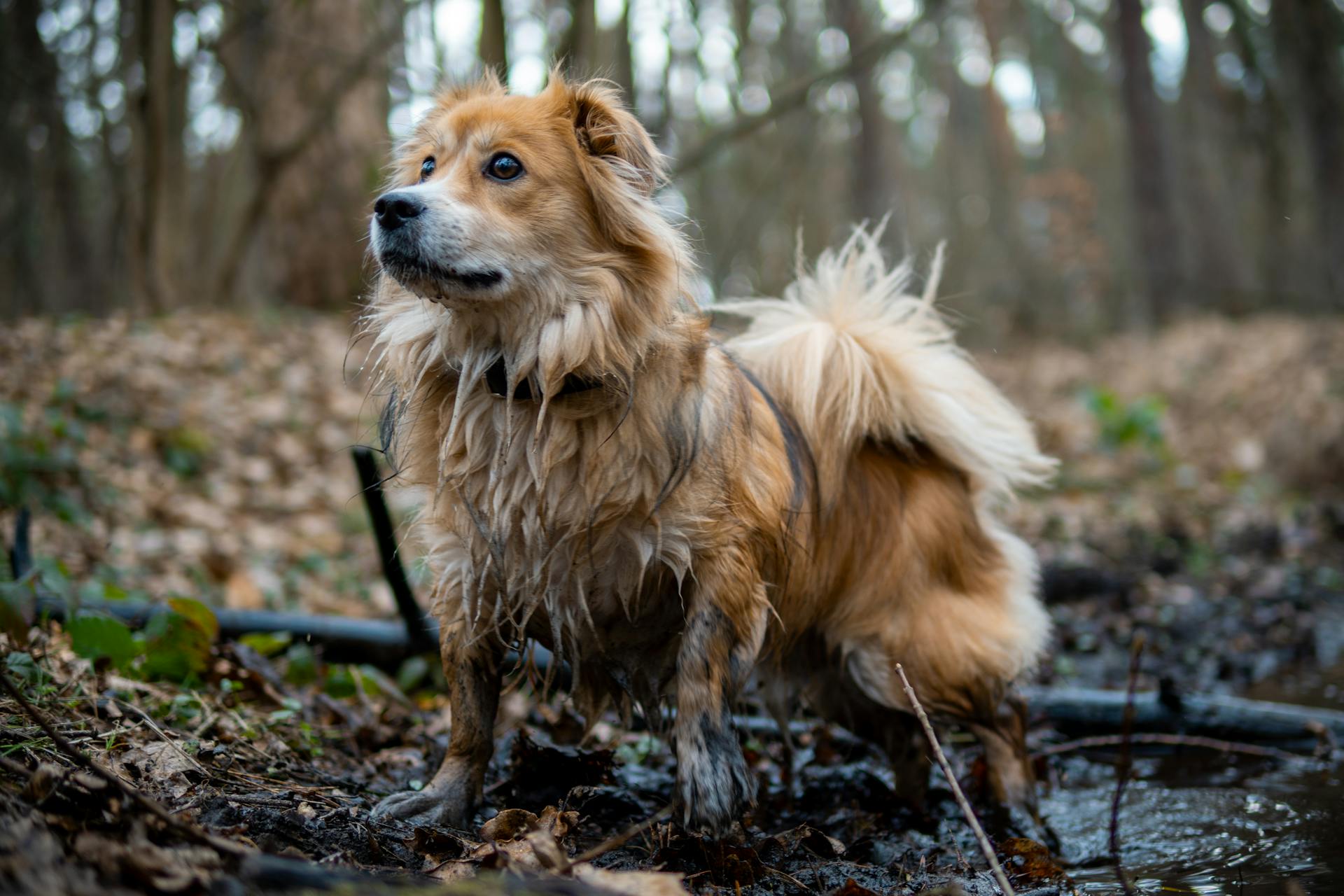
The Small Munsterlander Pointer is a medium-sized breed with a sturdy build. Males stand 20.5 to 22 inches at the shoulder.
Their height range is quite consistent, with females being slightly shorter, ranging from 19.75 to 21.25 inches.
In terms of weight, you can expect these dogs to range from 40 to 60 pounds, which is a decent size for a hunting companion.
Breed History and Origin
The Small Munsterlander Pointer has a rich history that spans over a century. They originated in Germany during the late 19th century.
Developed by crossing long-haired hunting dogs with local German pointers, the breed was designed to be a well-rounded gundog capable of tracking and retrieving game in various terrains. This deliberate breeding led to the emergence of a distinct type by the early 20th century.
In 1919, the Small Munsterlander Club was founded, solidifying breeding standards for the breed. The breed gained recognition from the German Kennel Club in 1922.
Despite facing challenges during World War II, dedicated breed enthusiasts ensured the Small Munsterlander’s survival.
For your interest: Small German Shepherds
Care and Maintenance
To keep your roan Small Munsterlander happy and healthy, regular exercise is a must. Engage your dog in daily walks, runs, and play sessions to meet their energetic needs.
Their dense double coat requires regular grooming to prevent matting and reduce shedding. Groom them regularly to keep them looking and feeling their best.
Regular veterinary check-ups are essential to catch any potential health issues early on. Schedule check-ups for vaccinations, preventive care, and health assessments to keep your dog thriving.
Care
To keep your Small Munsterlander Pointer happy and healthy, regular exercise is a must. Daily walks, runs, and play sessions will help meet their energetic needs. Engage your dog in interactive games and puzzle toys to provide mental stimulation.
A dense double coat requires regular grooming to prevent matting and reduce shedding. Check and clean their ears routinely, especially if they have floppy ears, to prevent infections. This is crucial to prevent ear infections, which can be painful and uncomfortable for your dog.
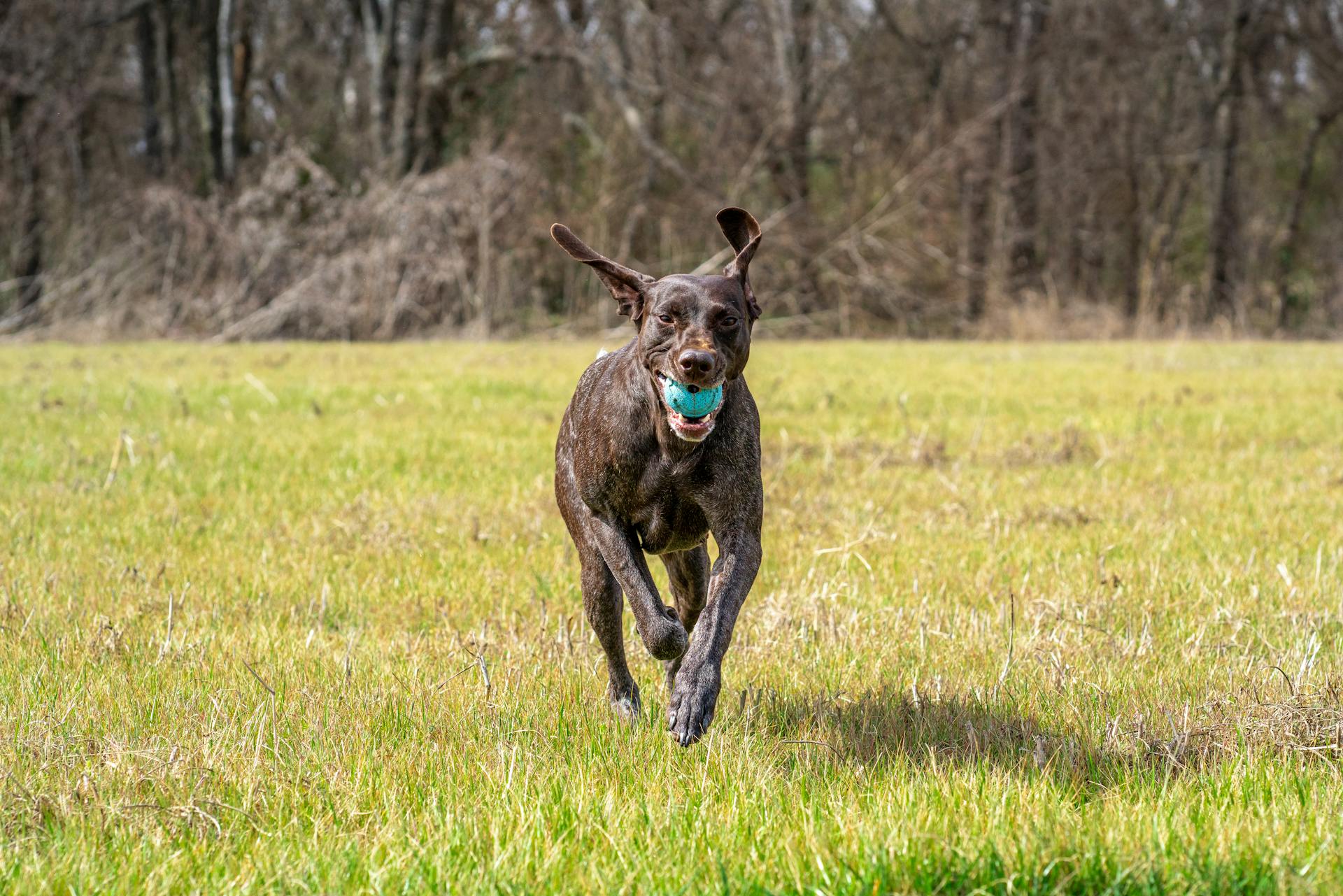
Nail trimming and dental hygiene are also essential. Regular brushing or dental treats will help keep your Small Munsterlander's teeth clean and healthy. Schedule regular veterinary check-ups for vaccinations, preventive care, and health assessments.
Here are some common health issues to be aware of and monitor:
- Hip Dysplasia: Regular veterinary check-ups and maintaining a healthy weight can help manage this condition.
- Ear Infections: Regular cleaning and inspection are essential to prevent infections.
- Eye Conditions: Regular eye check-ups can help monitor and address issues like cataracts or progressive retinal atrophy.
- Allergies: Identifying and managing allergens through a balanced diet and proper grooming are crucial.
- Elbow Dysplasia: Similar to hip dysplasia, elbow dysplasia is a genetic condition that affects the proper development of the elbow joint.
- Autoimmune Disorders: Some autoimmune disorders may be seen in Small Munsterlander Pointers, affecting the immune system's ability to function properly.
- Ear Hematomas: Due to their active nature and floppy ears, Small Munsterlanders may be prone to ear hematomas, which are pockets of blood that form between the skin and cartilage of the ear.
Feeding
Feeding is a crucial aspect of caring for your Small Munsterlander Pointer. Choose a high-quality commercial dog food suitable for your dog's age, whether it's a puppy, adult, or senior.
Their active lifestyle means calorie requirements can vary, so pay attention to portion control to prevent overfeeding. Regular weight checks are essential to maintain a healthy weight.
Schedule regular veterinary check-ups to monitor your Small Munsterlander's overall health and discuss any dietary adjustments or concerns with your veterinarian.
Family and Socialization
The Small Munsterlander Pointer is a wonderful breed for families with kids, as they're known for their gentle and patient demeanor.
Their energetic nature makes them a great match for active kids who love playing fetch and going on outdoor adventures. They're also quick learners and thrive on mental stimulation, which makes them excellent companions for families who enjoy engaging in various activities together.
Small Munsterlanders are generally very social and get along well with other pets when introduced properly. Early socialization is crucial to ensure a smooth integration process, allowing them to understand and adapt to the dynamics of the existing pet family.
Their adaptability and loyalty make them an ideal and versatile canine companion for families and individuals alike. Whether you're a family with kids or a single person, a Small Munsterlander Pointer can bring joy and companionship into your life.
Their keen sense of awareness also makes them excellent watchdogs, always keeping a watchful eye on their surroundings.
Training and Performance
Training a roan Small Munsterlander requires patience and a flexible approach. They are intelligent dogs, but also known to be somewhat stubborn.
Small Munsterlanders are trainable, but a firm but gentle hand is recommended by breeders. This means setting clear boundaries and rewarding good behavior.
They tend to be close-working dogs with an animated field search, but their range can vary from 50 to 200 yards. Some may take longer to develop their pointing instincts than others.
Their retrieving and tracking instincts are reliably strong, with most showing a desire to retrieve early in age. In fact, they're known around the world for their tracking ability, even in big game hunting.
Here's a breakdown of their performance characteristics:
If you're willing to wait for them to click, you'll be rewarded with an excellent hunting partner.
Frequently Asked Questions
What color is a Small Munsterlander roan?
A Small Munsterlander roan has a coat with brown patches and ticking, featuring a mix of brown and white. This distinctive coloration is often seen in light-roan varieties, such as Remi.
How much does a Small Munsterlander cost?
The adoption fee for a Small Munsterlander is $1,850 plus tax, with additional costs for shipping ranging from $400-450.
Sources
- https://www.akc.org/dog-breeds/small-munsterlander/
- https://dogtime.com/dog-breeds/small-munsterlander-pointer
- https://projectupland.com/hunting-dogs/small-munsterlander-dog-profile/
- https://www.muddypawsgarfield.com/small-munsterlander
- http://pointingdogblog.blogspot.com/2012/03/breed-of-week-small-munsterlander_28.html
Featured Images: pexels.com
